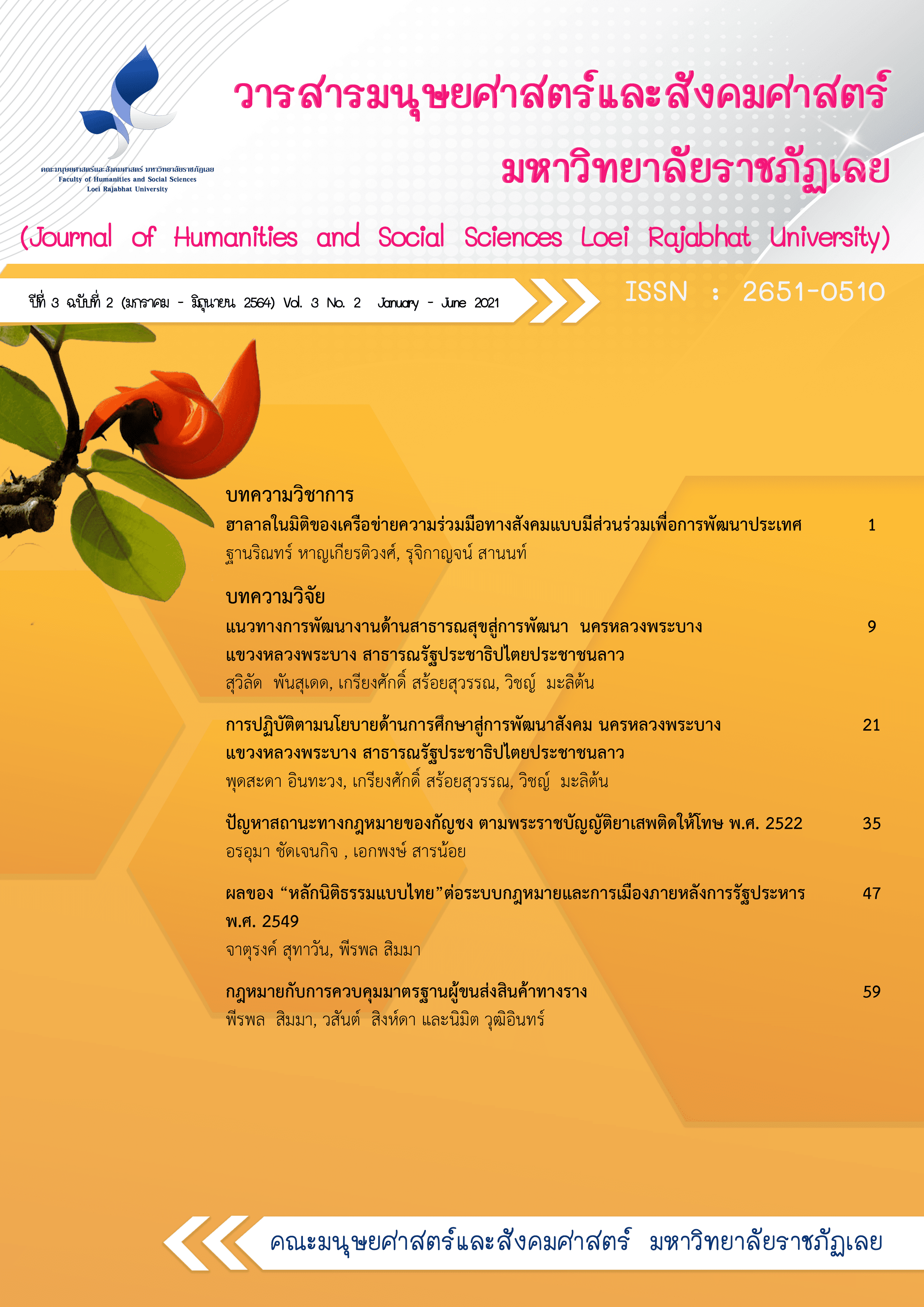Halal in Social Paticipation Cooperation Networks Dimention for Country Development
Keywords:
Hala, Cooperation networks, Social participation, DevelopmentAbstract
The paper aimed at to present the halal in social participation cooperation networks dimension for country development. We found that the halal in social participation cooperation networks dimension for country development can describe in 8 topics: 1) Development of utilities, 2) social psychological development, 3) economic development, 4) educational system development, 5) justice development, 6) telecommunication network development, 7) trade and investment development, and 8) political development. Each aspect of development must be formed through government cooperation. Private Sector People and civil society together. Decide to work together, benefit and evaluate collaboration in the form of a participating cooperation network for sustainable development of Thailand.
References
กรมส่งเสริมอุตสาหกรรม. (2564). ยุทธศาสตร์การส่งเสริมและพัฒนาศักยภาพธุรกิจสินค้าและบริการฮาลาล (พ.ศ. 2559-2563), สืบค้นเมื่อ 25 มีนาคม พ.ศ. 2564, จาก https://www.dip.go.th/Portals/0/2558/Busarin/%E0%B8%82%E0%B9%88%E0%B8%B2%E0%B8%A7%E0%B8%9D%E0%B8%B2%E0%B8%81/Halal%20Strategy.pdf
กองส่งเสริมและพัฒนาเครือข่าย. (2547). รายงานการวิจัยสถานการณ์เครือข่ายด้านเด็ก เยาวชน ผู้ด้อยโอกาส คนพิการและผู้สูงอายุ. กรุงเทพฯ: สำนักงานส่งเสริมสวัสดิภาพและพิทักษณ์เด็ก เยาวชน กระทรวงการพัฒนาสังคมและความมั่นคงของมนุษย์.
ชัชวาล สิงหาทอง, เปรมจิตต์ ขจรภัย ลาร์เซ่น, ช่อเพชร เป้าเงิน และมารุต พัฒนผล. (2563). การพัฒนารูปแบบการบริหารจัดการเครือข่ายความร่วมมือของสถานศึกษาด้านวิชาการของกลุ่มโรงเรียนเฉลิมพระเกียรติสังกัดสำนักงานคณะกรรมการการศึกษาขั้นพื้นฐาน, Journal of Modern Learning Development, 5(1), 231-245.
นันทรัตน์ นามบุรี, สันติ อารักษ์คุณากร, ไญยิกา ยอดสุดเอียม, อัลอามีน มะแต, อาดัม ไกรสุทรังค์, มนัส สุทธิการ และ ฮาซียะห์ ดอรอแซ. (2561). การพัฒนากลุ่มวิสาหกิจชุมชนผู้ผลิตอาหารฮาลาลในเขตสามจังหวัดชายแดนใต้เพื่อสร้างความสามารถทางการแข่งขันทางการค้าสู่สากล, ได้รับทุนอุดหนุนจากงบประมาณแผ่นดินประจำปี 2561.
ปิ่นมนัส จันทนวงษ์. (2562). การท่องเที่ยวแบบฮาลาลมีอิทธิพลต่อความพึงพอใจในการให้บริการของนักท่องเที่ยวมุสลิมในจังหวัดชลบุรี, หลักสูตรบริหารธุรกิจมหาบัณฑิต สาขาวิชาการจัดการธุรกิจโลก วิทยาลัยพาณิชยศาสตร์ มหาวิทยาลัยบูรพา.
สำนักงานมาตรฐานสินค้าเกษตรและอาหารแห่งชาติ. (2564). มาตรฐานอาหารฮาลาลแห่งชาติ, สืบค้นเมื่อ 25 มีนาคม พ.ศ. 2564, จาก https://www.acfs.go.th/halal/general.php
ศูนย์วิจัยกสิกรไทย. (2561). โอกาส SME ไทย ชิงตลาดฮาลาลโลก, สืบค้นเมื่อ 25 มีนาคม พ.ศ. 2564, จาก https://www.kasikornbank.com/th/business/sme/KSMEKnowledge/article/KSMEAnalysis/Documents/Thai-SME-Opportunity_Halal-Market.pdf
อารยา อายุบเคน และวิโรจน์ เจษฎาลักษณ์. (2558).มาตรฐานการดำเนินงานการผลิตอาหารภายใต้เครื่องหมายฮาลาลของผู้ประกอบการธุรกิจอาหารในจังหวัดนนทบุรี, Veridian E-Journal, Silpakorn University, ฉบับภาษาไทย สาขามนุษยศาสตร์ สังคมศาสตร์ และศิลปะ, 8(2), 1327-1340.
อิสมาแอล เบญอิบรอฮีม และ ธนสฤษฏิ์ สตเวทิต. (2561). วัฒนธรรมแบบมีส่วนร่วมทางการเมืองของประชาชนกับการพัฒนาความมั่นคงในพื้นที่สามจังหวัดชายแดนใต้ของไทย, บัณฑิตวิทยาลัย มหาวิทยาลัยสวนดุสิต. ปีที่ 14 ฉบับที่ 3 ประจำเดือนกันยาน-ธันวาคม 2561, 79-90.
Cohen, J. M., & Uphoff, N. T. (1980). Participation's place in rural development: seeking clarity through specificity. World development, 8(3), 213-235.
Dong, X., Yu, C., & Hwang, Y. S. (2021). The Effects of Reverse Knowledge Spillover on China’s Sustainable Development: Sustainable Development Indicators Based on Institutional Quality. Sustainability, 13(4), 1628.
Fornaroff, A. (1980). Community Involvement in Health System for Primary Health Care. Geneva: World Health Organization.
Gerber, M. L. (2020). Global Health Security and Development Indicators (Doctoral dissertation, Tulane University, Payson Center for International Development).
Kittayarak, K. (2003). The Thai Constitution of 1997 and its implication on criminal justice reform. Resource Material Series of United Nations Asia and Far East Institute For the Prevention of Crime and the Treatment of Offenders, 60, 107-117.
Nilsson, A. E., & Larsen, J. N. (2020). Making regional sense of global sustainable development indicators for the Arctic. Sustainability, 12(3), 1027.
Oliveira, G. M., Vidal, D. G., Viterbo, L. M. F., & Maia, R. L. (2020). Measuring the implementation of Sustainable Development Goals at a local level: The WeGIx index. In Universities and Sustainable Communities: Meeting the Goals of the Agenda 2030 (pp. 215-245). Springer, Cham.
Vasylieva, T. A., Bilan, S., Bahmet, K. V., & Seliga, R. (2020). Institutional development gap in the social sector: Cross-country analysis.
Wasserman, S., Faust, K., & Faust, K. (1994). Social Network Analysis. Structural Analysis in the Social Sciences.
Worldpopulationreview.com. (2020). Muslim Population By Country 2020, Retrieved date: 25 March, 2021, https://worldpopulationreview.com/country-rankings/muslim-population-by-country
Downloads
Published
Versions
- 2023-02-27 (2)
- 2021-06-30 (1)








